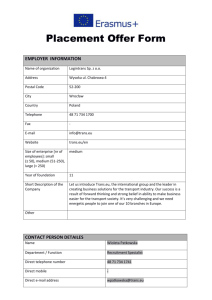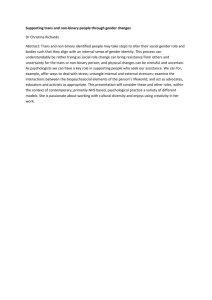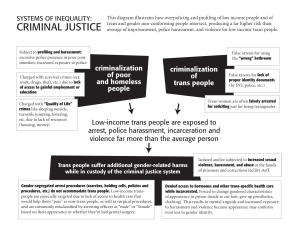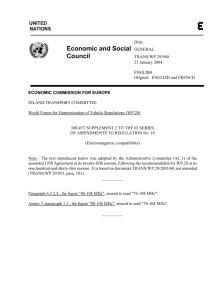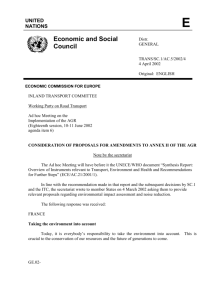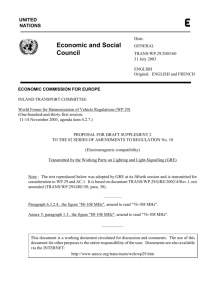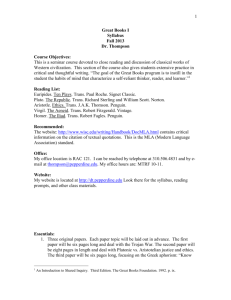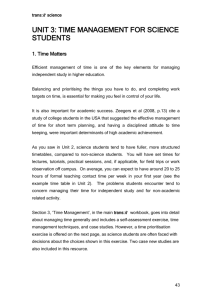Trans 101 workshop
advertisement
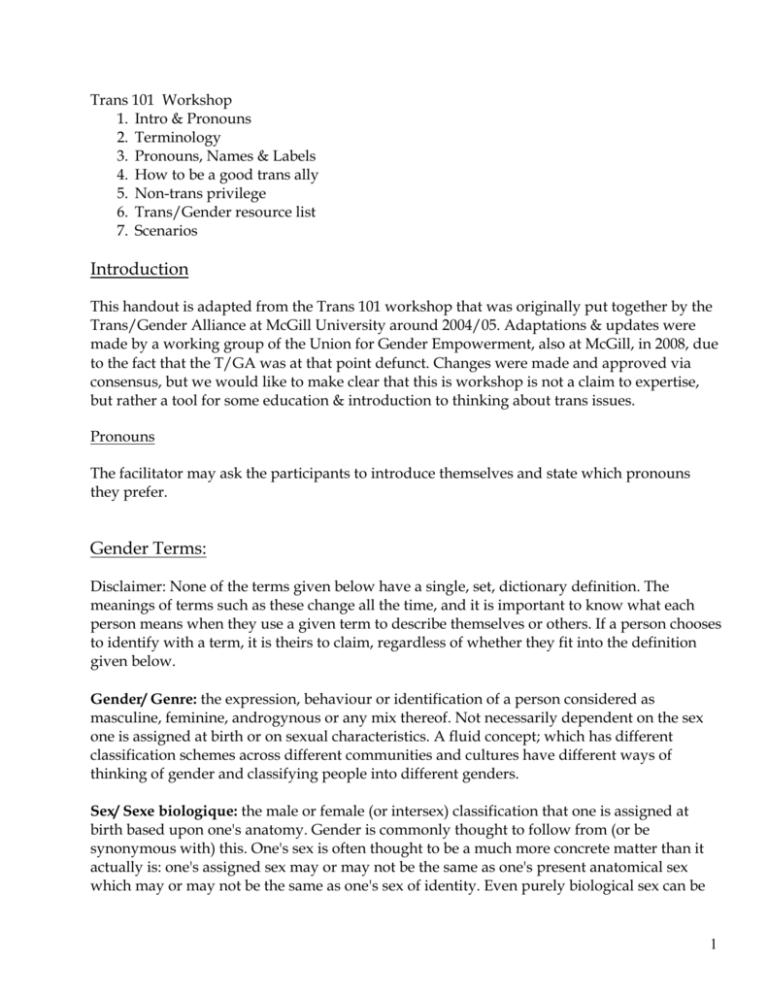
Trans 101 Workshop 1. Intro & Pronouns 2. Terminology 3. Pronouns, Names & Labels 4. How to be a good trans ally 5. Non-trans privilege 6. Trans/Gender resource list 7. Scenarios Introduction This handout is adapted from the Trans 101 workshop that was originally put together by the Trans/Gender Alliance at McGill University around 2004/05. Adaptations & updates were made by a working group of the Union for Gender Empowerment, also at McGill, in 2008, due to the fact that the T/GA was at that point defunct. Changes were made and approved via consensus, but we would like to make clear that this is workshop is not a claim to expertise, but rather a tool for some education & introduction to thinking about trans issues. Pronouns The facilitator may ask the participants to introduce themselves and state which pronouns they prefer. Gender Terms: Disclaimer: None of the terms given below have a single, set, dictionary definition. The meanings of terms such as these change all the time, and it is important to know what each person means when they use a given term to describe themselves or others. If a person chooses to identify with a term, it is theirs to claim, regardless of whether they fit into the definition given below. Gender/ Genre: the expression, behaviour or identification of a person considered as masculine, feminine, androgynous or any mix thereof. Not necessarily dependent on the sex one is assigned at birth or on sexual characteristics. A fluid concept; which has different classification schemes across different communities and cultures have different ways of thinking of gender and classifying people into different genders. Sex/ Sexe biologique: the male or female (or intersex) classification that one is assigned at birth based upon one's anatomy. Gender is commonly thought to follow from (or be synonymous with) this. One's sex is often thought to be a much more concrete matter than it actually is: one's assigned sex may or may not be the same as one's present anatomical sex which may or may not be the same as one's sex of identity. Even purely biological sex can be 1 defined in term of chromosomes, anatomy, hormones, or any combination, and there are always people who are male under one definition and female under another. Gender identity/ identité de genre: one's inner feelings of being a woman, man, or something else entirely. Gender expression or presentation: how one expresses oneself, in terms of dress and/or behaviours that can be characterized in ways including (but not limited to) feminine and masculine. Sex/Gender Binary: the system that holds that there are, and should be, only two genders and that one's gender or most aspects of it are inevitably tied to assigned sex. Intersex: people who are born with or develop primary and secondary sex characteristics that do not fit neatly into society's definitions of male or female. Many intersex babies/children receive surgical intervention (without their consent and sometimes without their knowledge) to make their sex characteristics conform to binary expectations. Intersex people do not necessarily identify as trans. While people may identify with the term hermaphrodite, intersex is considered a more neutral term. Transgender/Transgenre: used most often as an umbrella term to include the following:: those whose gender identity, behaviour, or expression is different from their assigned sex; those whose gender changes at some point in their lives; those who identify as a gender outside the man/woman binary; those who have no gender or multiple genders; those who perform gender or play with it (e.g. in drag contexts); and others Cisgender/ Cisgenre: identifying with the gender assigned to you at birth. Some people say non-transgender. Trans(s)sexual (TS): those who identify as members of a sex that is different from the sex they were assigned at birth. Many pursue hormones and/or surgical interventions, but not all those who pursue such medical interventions identify as transsexual. Cissexual: Julia Serano defines this term to refer to: "people who are not transsexual and who have only ever experienced their subconscious and physical sexes as being aligned". Trans: a term commonly used to refer to transgendered and/or transexual people. While it is often used as an umbrella term, some people identify just as trans. Can be used to form other words such as transkids, transpeople, etc. Gender Non-conforming: A term for individuals whose gender expression is different from societal expectations related to gender. 2 Transition: the process of changing one's gender expression. It may include any combination of coming out; changing one's dress, appearance, and mannerisms; changing one's name and/or pronouns; hormones; surgery. Passing: the act of living and/or being perceived as a certainthe gender, sexuality, etc.. This is often used to refer to “suceeding” at presenting one's gender of choice one wishes to be perceived as., but people can pass in other circumstances, sometimes even when they don't want to. MTF/M2F: a person who transitions from male to female. FTM/F2M: a person who transitions from female to male. Trans man: a trans person identifying or living as a man. Usually FTM or intersex-to-male. Often will simply identify as a man without the prefix 'trans'. Trans woman: a trans person identifying or living as a woman. Usually MTF or intersex-tofemale. Often will simply identify as a woman without the prefix 'trans'. Queer / allosexuel: a term that was once (and in some places still is) derogatory, but has been reclaimed to refer to those of non-normative sexualities. Can be used as an umbrella term to refer to gays, lesbians, bisexuals, cisgendered people, transgendered people, allies, leather fetishists, and others, although some people simply identify as 'queer' and nothing else. Not all people in the above subcategories identify as queer, and many people not in the above groups do. Genderqueer/intergenre: a term used to refer to non-normative gender identities. It can be used as an umbrella term to cover all gender identities other than man-born-male and womanborn-female, or can be used to refer to a specific gender that is neither man nor woman. The terms 'gender variant', 'gender outlaw', 'omnigendered', 'polygendered', and others all refer to people falling under the genderqueer umbrella. (syn. Français: agenre, omnigenre, polygenre..) Two Spirit: a term used among many Native American and Canadian First Nations indigenous groups to refer to people whose gender-variant sexualities and/or gender identities are seen as non-normative by colonialist non-native mainstream culture. While this concept might overlap with our concept of queer or genderqueer, this concept can only be fully understood from within Native culture. If you want to learn more about this term, see our resource list.. Crossdresser (CD): a person who crosses gender boundaries by the way they dress at least partially or part of the time. While some people may identify with the term transvestite, crossdresser is considered a more neutral term. 3 Drag King: a person who performs a masculine role but may or may not have any masculine expression in their everyday life - generally in reference to a stage performance. Drag Queen: a person who performs a feminine role but may or may not have any feminine expression in their everyday life - generally in reference to a stage performance. Ally/ AlliéE: a person who actively supports the struggles of a minority or oppressed identity group (such as transpeople), but may not be a member of that group themselves. 4 Terms & Ideas – Some thoughts on language and actions It is important that privilege is recognized. Why are you bringing up someone’s transhood? Why is it necessary to point our that someone is trans? Are you talking about transpeople to prove your inclusiveness, coolness, progressiveness, etc? Are you using a particular transperson to prove a point? Are you using them for your purposes? In a political context, is that person out? Do they feel comfortable having you out them? Are you taking their safety into account? Are you respecting their identity? Do they identify as a transwoman or as a woman? Do you recognize that there are a million ways to be trans or genderqueer? 1. If you are making a distinction between trans and non-trans people AVOID using prefixes like bio- or real- or genetic- or regular- or natural- or normal-. This further “others” transpeople and is unnecessary. “bio/genetic” makes it sound like transpeople are robots or genetic freaks “real” takes away gender authenticity “regular”, “normal”, “natural” are offensive USE TRANS and female/male-assigned or NON-TRANS and CISGENDERED Many trans people and allies have suggested using ‘trans’ for transgendered individuals and ‘non-trans’ or ‘cisgendered’ for non-transgendered individuals. This sets up trans as the default. With ‘trans’ standing in as normative, transphobia and gender privilege become clear and obvious. Not only is trans/non-trans politically powerful, it is also the least offensive. So if you need to talk about someone being trans (ie. Michelle is a transwoman) consider also referring to people who are not transgendered as non-trans. (ie. Julia is a non-trans woman). This takes away the stigma and “othering” from transpeople, and shows how gender plays such a prominent role in our conversations, ideas, language and actions. Cisgendered also accomplishes this, by naming what is considered to be a 'normative' identity. By saying "assigned female/male at birth" rather than "born a boy/girl" or "womyn-bornwomyn" for trans and non-trans people indicates a recognition of a binary system that only recognizes two genders and two sexes. At birth, doctors and society at large label individuals as either men or women. They assign a gender identity based on recognized genitals, just as they assign a meaning to gender and create the implications. The social construction of binary gender affects individuals through this naming process, and gives meaning to those names/labels. By using "assigned" rather than "born" or "used to be," one disrupts preconceived notions about gender and sex. 2) Pronouns are an extremely sensitive area. If a transperson has indicated that they like a particular pronoun, use it. If that person's gender expression does not match up in your mind (e.g. they "look/sound like a woman" to you but would like to be called he/him and use his chosen name), it is still a matter of respect and dignity to use it. Your personal conceptions of gender identities are not shared by everyone. 5 If you are unsure of someone's pronoun preference, ask. The model you can use is: "What pronoun do you prefer?" Or, if you are in the company of friends of this person, you can ask them or pick up on what they use with reference to the person you're unsure about. Ultimately, it is better to ask in a nice polite and respectful way rather than assume you know. Try using the gender neutral 'they' for people whose pronouns you're unsure of - and you can extend that courtesy to everyone, whether or not you read them as trans. Many trans people and genderqueer folk use standard pronouns like "he" or "she." Others enjoy using a mix of he and she. Still others would like to be referred to by their names, or third-person plural ("they/them") or ze/hir. People choose their pronouns based on numerous factors. Sometimes it's a matter of comfort, sometimes it's political motivation and sometimes it's personal. Respect what people ask you to call them. If someone would like to be referred to as they, call them "they." Don't talk about how grammatically incorrect it is, or how weird it sounds. If someone would like to be referred to as "ze," use it. Don't talk about how dumb it is, or how hard, or how it makes you feel uncomfortable. Just because it is less common does not make it less valid. This also applies to names. If you've known someone by their given name for 15 years or 2 weeks and they ask you to call them by their chosen name, do it. Like pronouns, chosen names are often closely tied to identity. If you struggle with seeing this person as their "new name," work harder. Practice in your head. If you make a mistake, fine, but work at not making the same mistake twice. What it comes down to is respect. The name that person has chosen is important to them; do not dismiss it. Also, that chosen name is their "real" name; don't tell people what their given name was. If someone wants to disclose their old name to you, it is up to them to disclose it. 3) Labels are extremely important to some people. People choose words or sentences as ways to describe their lives to the outside world and as a way to understand themselves. Trans people and genderqueers are no different. If you encounter a term or label you are not familiar with, take the time to educate yourself. Take the time to get your mind around the concept and understand what it means to people on a personal, social and political level. 6 Gender Neutral Pronouns Nominative (subject) Accusative (object) Possessive adjective She She laughed I called her Her eyes gleam That is hers She likes herself He He laughed I called him His eyes gleam That is his He likes himself Singular they They laughed I called them Their eyes gleam They like themself/themselves Spivak (new) Ey laughed I called em Eir eyes gleam That is eirs Ey likes emself Ze and hir Ze laughed I called hir Hir eyes gleam That is hirs Ze likes hirself Zie I called zir Zir eyes gleam That is zirs Zie likes zirself Zie laughed Possessive pronoun That is theirs Reflexive See http://en.wikipedia.org/wiki/Gender_neutral_pronouns for more examples of genderneutral pronouns Un pronom de genre neutre en Français: “ille”. Fill in the blanks with the names & gender-neutral pronouns of your choice to practice! The other day, R_______ left the house to buy some groceries. As _____ walked down the stairs, ____ noticed that _____ had forgotten _____ keys on the hook upstairs, and had to go back and get them. `Zut!’ _____ cursed, under ______ breath ( not because _____ was lazy, but because _____ had twisted _____ ankle the other day, and it still hurt). `I’ll have to go back up!’ As A_______ understood it, in movies and the like it is common for someone to be so striking that when they walk down the stairs the crowd goes silent. In life, ____ had never seen it. But it happened with C______. _______ walked down the stairs in slow motion, surrounded by afterglow and fuzzy lighting. And not only was ______ the most attractive person A_______ had ever seen, _______ was looking right at _____. 7 How to be a good trans ally For this section, have the group put their sheets down, and ask them to brainstorm ways to be a good trans ally - write down answers on a flipchart. How can they be good trans allies in their specific organization? Once the brainstorm/discussion has happened, talk about the way that this list is written, and the fact that there have been comments made in the past about its confrontational tone. Talk about the legitimacy of anger at questions that have to be faced every day, even from strangers. How does guilt play into this? What makes people who feel attacked by this list identify with defensiveness instead of the frustration of the writer? Use the right pronouns and name. If you are unsure, ask someone. Don’t ask transpeople what their “real” name is (i.e. the one they were born with) On the flip side, ask a transperson when and where it is safe to use their chosen name and pronouns. For instance if a transperson is NOT out to certain people ask them how you should refer to them in that context. Don’t out a trans person as Trans. i.e. If someone is living as a woman, refer to them as such, rather than as a transwoman or trans. If you do know the birth name of a transperson don’t tell it. If a transperson wants people to know, they are the ones who should disclose it. Don’t use terms like “real” man/boy. Instead, use trans and non-trans (ie. trans boy/ non-trans boy) Also use “male/female assigned at birth” rather than “born as a girl/boy" Don’t tokenize. Adding a T to LGB does not make you progressive, cool, or an ally. Make sure you have the resources, knowledge and understanding to deserve that T. Make sure you pare prepared to engage in the fight for trans rights and visibility. Make sure you have educated yourself. Make sure you are prepared to be a good ally and offer more than mere lip service. Don’t confuse gender with sexual preference. Trans people are straight, gay, bi, pansexual, asexual, etc. Gender is not necessarily tied to sexual preference, and like any non-trans person there are a million ways to express desire. If you find yourself saying “I would date a trans boy BUT not a non-trans boy” or conversely "I would date a non trans woman but not a transwoman" check that. Don’t ask transpeople to educate you. Do your own homework and research. It is not transpeople’s duty to spend their time and energy on you so you ‘get it’ (see attached resource page). Don’t ask transpeople about their bodies, how they have sex, what their genitals look like, etc. It’s rude and it’s none of your business. Don’t ask about surgery or hormone status. Don’t ask transpeople “when are you going to have THE surgery” or “are you on hormones?” or anything surrounding their bodies, the medical establishment, or private details regarding their lives (also see next point) Don’t assume that the only way to transition is through hormones/surgery Don’t assume all trans people want hormones or surgery Don’t tell transpeople what is appropriate to their gender (ie. telling transwomen to 8 grow their hair out and wear dresses) Don’t assume transmen are exempt from male privilege , misogyny, sexism, etc. because of a so-called ‘girl past’ Recognize that transwomen deal with sexism in a very real way (in addition to transphobia). This includes the exclusion of transwomen from “womyn-only” spaces. Recognize that transwomen deserve access to “womyn-only” spaces, programs, shelters, etc. Don’t assume all transpeople identify as ‘men’ or ‘women’. Many trans people and genderqueer people identify as both, neither, or as something altogether different. Recognize that not all transpeople or genderqueer folk are out there trying to smash the binary. Recognize that it is not heir responsibility. If you want to smash the binary, then you do it! Don’t assume trans people feel “trapped in the wrong body”. This is an oversimplification and not the way (all) transpeople feel. Recognize the privilege of normatively gendered individuals. If you are normatively gendered, recognize your privilege and prejudice. Do listen if a transperson chooses to talk to you about their transhood. Don’t tell them about chromosomes, a class you took in school, etc. It is their life, and it is not your place to put theory, judgments, beliefs, etc. on them. Do recognize the gap between theory and lived experience. Gender theory is not synonymous with trans lives. Think about what makes you feel uncomfortable and why. Recognize the diversity of trans and genderqueer lives. That these identities are part of other identities, and often intersect with race, class, sexual preference, etc. Don’t let transphobia slide. Transphobia comes in countless guises and as a non-trans ally it is your duty to confront it. Trans issues are rarely if ever discussed and when they are it is more often than not in a negative light. Transphobia is similarly oppressive to sexism, homophobia, heterosexism, racism, etc. Talk about trans issues/rights. Engage people in discussions and share your knowledge. The majority of the ‘information’ people have surrounding transpeople are stereotypes and assumptions. To most people, trans folks are the freaks from Jerry Springer. Provide resources. Someone who is questioning their gender should be met with understanding and compassion. They should be offered materials (books, internet sites, etc.) as well as a sympathetic ear. Anyone who is curious or interested in gender should be met with encouragement and enthusiasm. Don’t just mourn or take action when transpeople are murdered. Celebrate trans lives and work at making trans and genderqueer individuals more visible on a day-to-day basis (ie. prevent murders) Above all, RESPECT and SUPPORT trans people in their lives and choices. 9 Non-trans Privileges Again, the handout isn't need for the first part of this section - ask the group to brainstorm barriers that trans people might face in their everyday lives. How are those barriers also put into place by factors of class, race, and ability? How can privileges change in different spaces or contexts? A question for personal reflection might be: what particular privileges do individual participants have or not have? More often than not, non-trans people are unaware of their privilege of being ‘normatively’ gendered. They are unaware of the ignorance, hatred and oppression that trans people experience, by default of being transgendered, transsexual, or othered. This is by no means an exhaustive list of the privileges non-trans people hold, but is worth reading. Though this list is focused on non-trans privilege, these also apply to a variety of other sources of privilege - i.e. a person who is chronically ill may be "expected to constantly defend their medical decisions", as in point #7. As a non-trans person… 1. Strangers don’t assume they can ask me what my genitals look like and how I have sex. 2. My validity as a man/woman/human is not based upon how much surgery I’ve had or how well I “pass” as a non-trans person 3. When initiating sex with someone, I do not have to worry that they won’t be able to deal with my parts or that having sex with me will cause my partner to question their own sexual orientation. 4. I am not excluded from events or spaces which are either explicitly or de facto* cisgendered people only. (*basically anything involving nudity) 5. My politics are not questioned based on the choices I make with regard to my body 6. I don’t have to hear “so have you had THE surgery?” or “oh, so you’re REALLY a [incorrect sex or gender]?” each time I come out to someone. 7. I am not expected to constantly defend my medical decisions. 8. Strangers do not ask me what my “real name” [birth name] is and then assume that they have a right to call me by that name. 9. People do not disrespect me by (purposefully) using incorrect pronouns ever after they’ve been corrected. 10. I do not have to worry that someone wants to be my friend or have sex with me in order to prove their ‘hipness’ or good politics. 11. I do not have to worry about whether I will be able to find a bathroom to use or whether I will be safe changing in a locker room. 12. When engaging in political action, I do not have to worry about the gendered repercussions of being arrested. (ie. what will happen to me if the cops find out that my genitals do not match my gender presentation? will I end up in a cell with people of my own gender?) 13. My experiences of gender (or gendered spaces) is not viewed as ‘baggage’ by others of the gender in which I live. 14. I do not have to choose between either invisibility (‘passing’) or being consistently ‘othered’ and/or tokenized based on my gender. 15. I am not told that my sexual orientation and gender identity are mutually exclusive. 10 16. When I go to the gym or a public pool, I can use the showers. 17. If I end up in the emergency room, I do not have to worry that my gender will keep me from receiving appropriate treatment, nor will all of my medical issues be seen as a product of my gender. (“your nose is running and your throat hurts? must be due to the hormones!”) 18. My health insurance provider (or public health system) does not specifically exclude me from receiving benefits or treatments available to others because of my gender. 19. When I express my internal identities in my daily life, I am not considered “mentally ill” by the medical establishment. 20. I am not required to undergo extensive psychological evaluation in order to receive basic medical care. 21. The medical establishment does not serve as a “gatekeeper” which disallows selfdetermination of what happens to my body. 22. People do not use me as a scapegoat for their own unresolved gender issues. Scenarios Alex is a student at an all-girls high school in downtown Montreal, and has been involved with the organizing of a young feminist conference since it’s inception (and is very committed to feminist values!). In the last few months, Alex has started wearing less feminine clothing and asked hir family, friends & classmates to refer to hir using the gender neutral pronouns ze and hir. Ze doesn’t identify as a girl anymore, but ze also doesn’t feel like a boy. Alex is beginning to feel really unsure about participating in the conference, since it was orginally conceived of as a ‘girls only’ space. How can we make things more comfortable for hir at this conference? 11 Resources Books (these are all available either in the UGE library or at Queer McGill) Body Alchemy: Transsexual Portraits. Loren Cameron. Cleis Press, 1996. (very hard to find) Disidentifications. Jose Munoz. University of Minnesota Press.1999. Female Masculinity. Judith Halberstam. Duke University Press. 1998. FTM: Female-to-male Transsexuals in Society. Aaron Devor. Indiana University Press. 1997. Gender Outlaw: On Men, Women and the Rest of Us. Kate Bornstein. Routledge, 1996. GENDERqUEER: Voices from beyond the sexual binary. Edited by Joan Nestle, Clare Howell, and Riki Wilchins. Alyson Books, 2002. Invisible Lives: The Erasure of Transsexual and Transgendered People. Viviane Namaste. University of Chicago Press, 2000. My Gender Workbook. Kate Bornstein. Routledge, 1998. Nobody Passes: Rejecting the Rules of Gender and Conformity. Edited by Matt Bernstein. Seal Press, 2006. ** Out & About: The Emancipated Cross Dresser. Lacey Leigh. Binary Star Press. 2002. Read My Lips: Sexual Subversion and the End of Gender. Riki Anne Wilchins. Firebrand Book. 1997. Sex Change, Social Change: Reflections on Identity, Institutions and Imperialism. Viviane Namaste. Women's Press, 2005. The Testosterone Files. Max Wolf Valerio. Seal Press, 2006.** The Transgender Studies Reader. Edited by Susan Stryker and Stephen Whittle. Routledge, 2006. Transmen and FTMs: Identities, Bodies, Genders, and Sexualities. University of Illinois Press, 1999. Whipping Girl: A Transsexual Woman on Sexism & the Scapegoating of Femininity. Julia Serano. Seal Press, 2007. 12 Internet www.strap-on.org trans & gender variant forum, under the "identity" heading. http://transnh.net/index.html - New Hampshire Transgender Resources for Education & Empowerment http://www.trans-academics.org/trans_and_sexuality_termi www.trans-academics.org www.safe2pee.org www.transgendercare.com Trans People of Colour-specific resources: (see books above tagged with **) http://community.livejournal.com/trans_poc - a livejournal/blogging community http://www.colorlines.com/article.php?ID=265 - an article on 'Becoming a Black Man' Montreal-Local Resources ASSTeQ - 514 847 0067/ 514 847 8850 Project 10 - http://www.p10.qc.ca/ (514) 989-4585 Head & Hands - http://www.headandhands.ca (514) 482 7910 En Francais: http://fr.wikipedia.org/wiki/transgenre http://fr.wikipedia.org/wiki/transgendérisme 13
